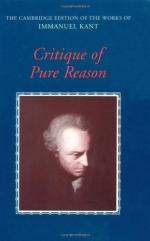|
This section contains 12,192 words (approx. 41 pages at 300 words per page) |

|
SOURCE: "Kant's Formula of Universal Law," in Pacific Philosophical Quarterly, Vol. 66, 1985, pp. 24-47.
In the following essay, Korsgaard evaluates different interpretations regarding the kind of contradiction referred to in Kant's first formulation of the Categorical Imperative.
Kant's first formulation of the Categorical Imperative, the Formula of Universal Law, runs:
Act only according to that maxim by which you can at the same time will that it should become a universal law. (G 421/39)1
A few lines later, Kant says that this is equivalent to acting as though your maxim were by your will to become a law of nature, and he uses this latter formulation in his examples of how the imperative is to be applied. Elsewhere, Kant specifies that the test is whether you could will the universalization for a system of nature "of which you yourself were a part" (C2 69/72); and in one place he characterizes the...
|
This section contains 12,192 words (approx. 41 pages at 300 words per page) |

|


